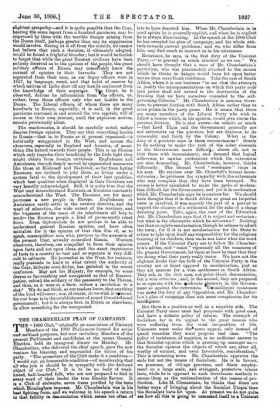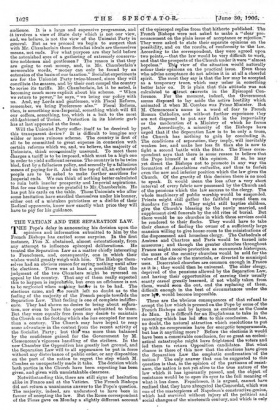THE CHAMBERLAIN PLAN OF CAMPAIGN.
11PHE " 1900 Club," originally an association of Unionist Members of the 1900 Parliament formed for social and militant purposes, but now including Members of the present Parliament and candidates at the recent General Election, held its inaugural dinner on Monday. Mr. Chamberlain, who delivered the chief speech, gave the new venture his blessing, and expounded the duties of his party. " The promoters of the Club make it a condition- 1 would, say, an honourable condition—of membership that all who join it should be in sympathy with the declared object of our Club." It is to be no body of weak- kneed, half-hearted folk, who are not prepared to find in every word of their leader the true Smaitic flavour. It is a Club of stalwarts, seven times purified by the tests which Birmingham imposes. Mr. Chamberlain was in his best fighting form, and we welcome, in his speech a return to that felicity in denunciation which seems too often of late to have deserted him. When Mr. Chamberlain is in good spirits he is generally explicit, and when he is explicit he is always illuminating. In the speech at the 1900 Club he has revealed his plan of campaign, and his whole atti- tude towards current problems ; and we, who differ from him, may find much to instruct us in his utterances.
Resistance, he says, is the first duty of the Unionist Party,—" to prevent as much mischief as we can." We should have thought that a man of Mr. Chamberlain's patriotism, who was passionately attached to the causes which he thinks in danger, would have hit upon better tactics than mere blank resistance. Take the case of South Africa, where it is our business " to see that the attempts to justify the misrepresentations on which this party rods into power shall not extend to the destruction of the freedom that we have ourselves conceded to the self- governing Colonies." Mr. Chamberlain is anxious, there- fore, to prevent friction with South Africa rather than to score points in the party game. He is aware that there are many members of the Liberal Party who wish to follow a course which, in his opinion, would give rise to the greatest friction. He is also aware—he admits as much —that Lord Elgin and the Government generally are not extremists on the question, but are desirous to do reasonably and fairly by the Colony. What is the duty of a patriotic man in these circumstances ? Surely to do nothing to make the task of the sober elements in the Government more difficult; above all, not to twit them with inconsistency, and demand that logical adherence to unwise professions which the extremists are also demanding. Mr, Chamberlain, however, thinks differently, The blessed word " resistance " rings in his ears. Re rejoices over Mr. Churchill's formal incon- sistenciee ; he professes his sympathy with the extremists who may complain that they have been betrayed. No course is better calculated to make the paths of modera- tion difficult for the Government, and yet it is moderation which Mr. Chamberlain says he is anxious for. We should have thought that if in South Africa so great an Imperial issue is involved, it was scarcely the part of a patriot to imperil the chances of a settlement for the sake of a cheap debating point. Take, again, the case of the Education Act. Mr. Chamberlain says that it is unjust and sectarian ; but what is the alternative which he advocates ? Nothing less than complete secularisation, though he refuses to admit the term ; for if it is not secularisation for the State to refuse to take upon itself any responsibility for the religious training of its children, then we do not know what the word means. If the Unionist Party are to follow Mr. Chamber- lain'e advice, and " resist " vigorously all the measures of the present Government, let them at least be clear that they are doing what their party really desire. We have not the slightest doubt that the bulk of the Unionist Party in the, country are at heart opposed to secularisation, just as they are anxious for a wise settlement in South Africa. They ask, in the first case, not point-blank denunciation, but a wise criticism ; and, in the second, they are prepared to co-operate with the moderate elements in the Govern- meat as against the extremists. vUaiutelligent resistance was never the duty of any Opposition, and Mr. Chamber- lain's plan of campaign does not seem conspicuous for its intelligence.
But there is a positive as well as a negative side. The Unionist Party must meet bad proposals with good ones, and have a definite policy of reform. The strength of Socialism lay in its appeal to the great masses who were suffering from the cruel inequalities of life. Unionists must make the° same appeal, only instead of quack remedies they must propose real ones. " The policy of resistance, of negation, is no sufficient answer to that Socialist opinion which is growing up amongst us,— the Socialist opinion the objects of which are, after all, worthy of earnest, and even favourable, consideration." This is interesting news. Mr, Chamberlain approves the ends but not the means of Socialism. He is in favour, we presume, of old-age pensions, and State employ. meat on a large scale, and stringent, protective labour laws, while he is opposed to such doctrinaire methods to secure them as the nationalisation of the means of pro- duction. Like M. Clemenceau, he thinks that there are better ways of bringing about the Socialist 'Utopia than the Socialists have hit upon. At present we do net quite see how all this is rias to coamaacl itself toe Unionist audience. It is a largo and expensive programme, and it involves a view of State duty which is not our view, and, we believe, is not the view of the Unionist Party in general. But as we proceed we begin to suspect that with Mr. Chamberlain these Socialist ideals are themselves means, not ends. For what purpose are they held before the astonished eyes of a gathering of extremely conserva- tive noblemen and gentlemen ? DThe reason is that they are going to cost money, and, in Mr. Chamberlain's memorable words, " money can only be found by an extension of the basis of our taxation." Socialist experiments are for the Unionist Party twice-blessed, since they will conciliate the guesses, and by their cost compel the country to revise its tariffs. Mr. Chamberlain, let it be noted, is becoming much more explicit about his scheme. " When we return to power," he says, " we bring our policy with us. And, my Lords and gentlemen, with Fiscal Reform, remember, we bring Preference also." Fiscal Reform, then, is something non-Imperial, something which will fill our coffers, something, too, whieh is a bait to the most old-fashioned of Tories. Protection in its historic garb has at last'appeared at the feast.
Will the Unionist Party suffer-itself to be deceived by this transparent device ? It is difficult to imagine any wilder or more ruinous scheme. The country is first of all to be committed to great expense in connexion with certain reforms which we, and, we believe, the majority of Unionists, think economically unsound. To meet these charges a tariff is to be imposed, which must be a high one in order to yield sufficient revenue. The countryis to be twice bled, first by a fallacious policy, and secondly by a fallacious means of paying for it. And on the top of all, an exhausted people are to be asked. to make further sacrifices for Imperial ends. We can think of nothing better calculated to ruin both insular prosperity and Imperial aspirations. But for one thing we are grateful to Mr. Chamberlain. He has put his cards on the table. Those Unionists who after some hesitation have enrolled themselves under his banner, either out of a mistaken patriotism or a dislike of their Radical opponents, know now exactly what price they will have to pay for his guidance.



























































 Previous page
Previous page